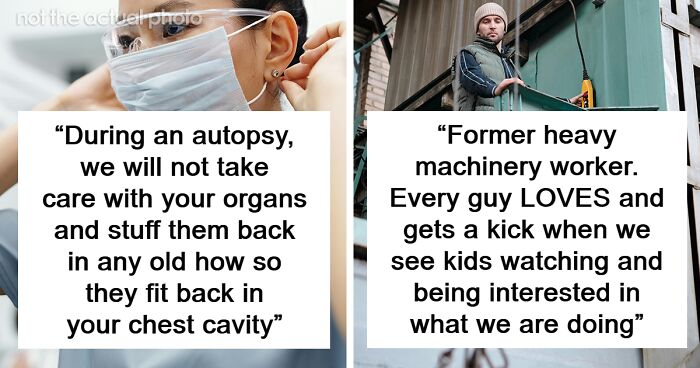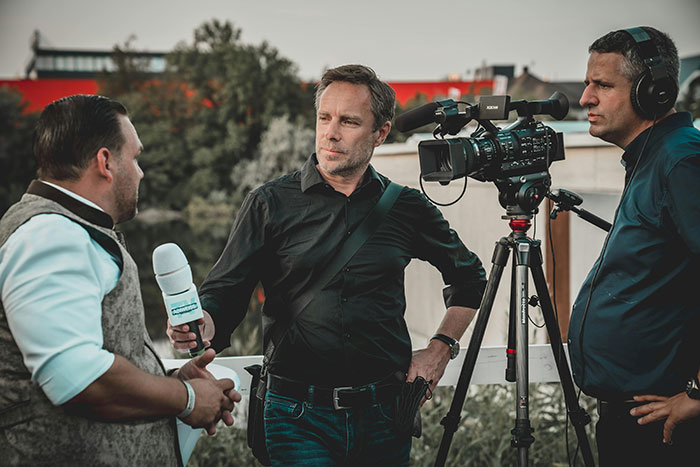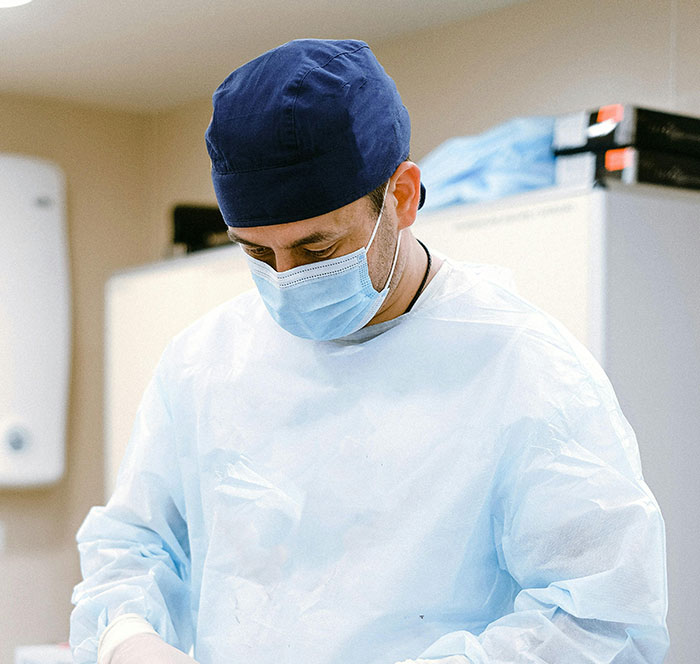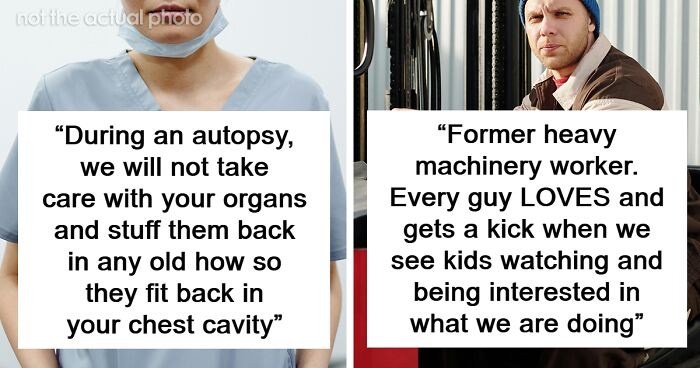
“What’s The Dark Secret About Your Profession That The General Public Doesn’t Know?” (30 Answers)
Every industry has its hidden side that may be unappealing. It’s akin to visiting the kitchen of your favorite restaurant and seeing how grimy and untidy it actually is from behind the scenes.
Much of this insider information remained concealed until someone posted this question on Reddit: “What’s the dark secret about your profession that the general public doesn’t know?”
People didn’t hesitate to respond, revealing what happens behind closed doors among lawyers, healthcare workers, educators, and service industry employees, to name a few.
Many of these answers may shock you and make you question the fabric of society. But if you want to read about juicy industry secrets, scroll through this list.
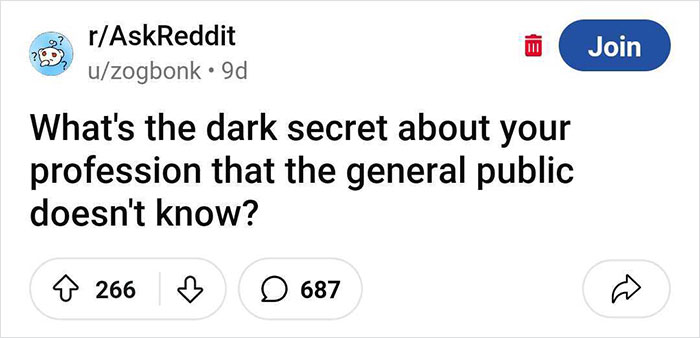
This post may include affiliate links.
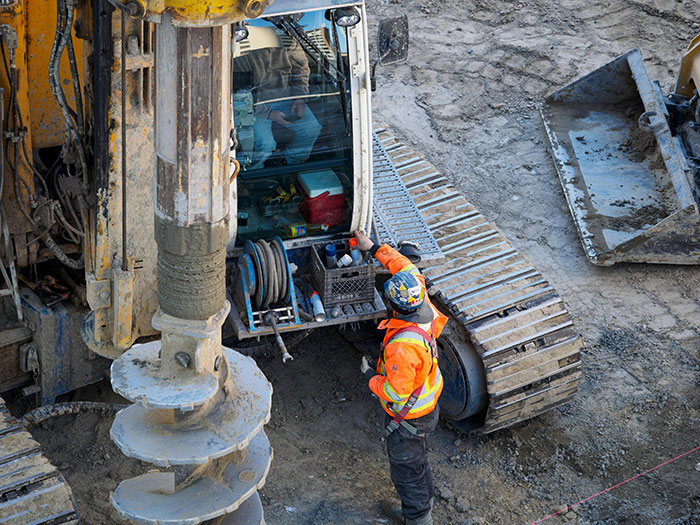 Former heavy machinery worker. Everything from in facility work to road and construction work.
Former heavy machinery worker. Everything from in facility work to road and construction work.
Every single guy...I mean every guy, that operates a backhoe or asphalt roller or bulldozer absolutely LOVES and gets a kick when we see kids watching and being interested in what we are doing. We all want to stop and let them on the machine and allow them to run it, but are only forced to not to because of rules and insurance.
When we get together for lunch we aren't talking about the women we saw. We're talking about the little boy in the red hoodie who clapped when we dumped a shovel. And not one guy teases you for thinking it was great, because otherwise the job is just grinding and our bosses suck.
I figured we needed a bit of positivity on this thread.
 It is entirely possible that your veterinarian will kiss your kitten's belly when you are not looking.
It is entirely possible that your veterinarian will kiss your kitten's belly when you are not looking.
 The number of completely incompetent employees working in health care settings is appalling.
The number of completely incompetent employees working in health care settings is appalling.
 I used to be a police officer: There were a lot of unspoken rules about making sure we had a high number of arrests. Demonstrating high arrest numbers meant we got federal/state grant money. This kept the prosecutor employed along with the entire court system and showed the town/city we needed a larger budget because of all the arrests. The entire criminal justice system is literally a giant business which [profits] off the backs of the public
I used to be a police officer: There were a lot of unspoken rules about making sure we had a high number of arrests. Demonstrating high arrest numbers meant we got federal/state grant money. This kept the prosecutor employed along with the entire court system and showed the town/city we needed a larger budget because of all the arrests. The entire criminal justice system is literally a giant business which [profits] off the backs of the public
 Economist here. The dirty secret is that economists do actually know what they're doing, politicians and pundits just ignore us and do whatever they want to make more money for the rich. Oh and all conservative economic theory is a made up scam. Trickle down is a scam.
Economist here. The dirty secret is that economists do actually know what they're doing, politicians and pundits just ignore us and do whatever they want to make more money for the rich. Oh and all conservative economic theory is a made up scam. Trickle down is a scam.
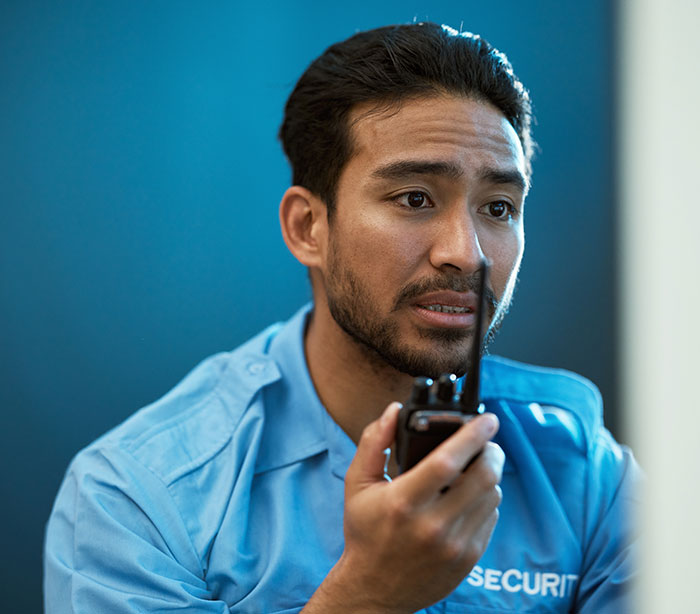 Security guard: In an active shooter event, we're not going to protect your a*s. We're heading to the nearest safe exit and calling the cops.
Security guard: In an active shooter event, we're not going to protect your a*s. We're heading to the nearest safe exit and calling the cops.
 80% of women with developmental disabilities will experience SA. The statistics are already horrible for neuro typical women but most people outside the field have no idea it's so high. It is horrific.
80% of women with developmental disabilities will experience SA. The statistics are already horrible for neuro typical women but most people outside the field have no idea it's so high. It is horrific.
 Funeral Director/Embalmer here. I don’t know that this is a particularly “dark” secret, but despite the rising popularity, the lack of understand around what cremation really is always shocks me. You do not get “ashes” back. You get back bone fragments. In school we had it drilled into us to never use them term “ashes” because it is so inaccurate and only perpetuates this misunderstanding. Your body is not reduced to a fine, powdery ash that will float off in the wind/water when scattered. It is reduced to large chunks of bone which are then processed to try to attain a fairly uniform consistency. Much more like a heavy sand.
Funeral Director/Embalmer here. I don’t know that this is a particularly “dark” secret, but despite the rising popularity, the lack of understand around what cremation really is always shocks me. You do not get “ashes” back. You get back bone fragments. In school we had it drilled into us to never use them term “ashes” because it is so inaccurate and only perpetuates this misunderstanding. Your body is not reduced to a fine, powdery ash that will float off in the wind/water when scattered. It is reduced to large chunks of bone which are then processed to try to attain a fairly uniform consistency. Much more like a heavy sand.
 Book editor. Unless you have a massive social media following/built-in audience already, chances are very small you'll get published by a major house. Chances are even smaller that you'll make any money from your book. Just self-publish if you really want to get your work out there: the publishing industry is 95% about making money and 5% about publishing decent books.
Book editor. Unless you have a massive social media following/built-in audience already, chances are very small you'll get published by a major house. Chances are even smaller that you'll make any money from your book. Just self-publish if you really want to get your work out there: the publishing industry is 95% about making money and 5% about publishing decent books.
 I work in the gas pipeline industry and there's been massive accidents and terror attacks people have no idea about and were never reported nor ever will be. All over the world.
I work in the gas pipeline industry and there's been massive accidents and terror attacks people have no idea about and were never reported nor ever will be. All over the world.
 When they make a pain cream, they put in ingredients to make you "feel" something, like menthol, because it's associated with "doing something" or "working". Simple not feeling anything (or less pain) is not associated with effecacy.
When they make a pain cream, they put in ingredients to make you "feel" something, like menthol, because it's associated with "doing something" or "working". Simple not feeling anything (or less pain) is not associated with effecacy.
 A boutique hotel I worked at didn’t wash comforters unless they had to. And even then you really had to push. I was pulled to help with housekeeping fairly regularly in the busy season, found a quilt with blood on it - sent it to laundry. It was sent back 5 mins for being “clean enough” 🤢🤮
A boutique hotel I worked at didn’t wash comforters unless they had to. And even then you really had to push. I was pulled to help with housekeeping fairly regularly in the busy season, found a quilt with blood on it - sent it to laundry. It was sent back 5 mins for being “clean enough” 🤢🤮
My housekeepers told me it was normal. I was horrified. I cringe staying at hotels and take a blanket when I can.
 Professors are regularly pressured into passing failing students to keep up graduation levels. I even had the registrar go into the system and change grades. Let’s just say I have seen my fair share of students who failed my science course but were passed by admins who are now building your bridges, interstates, buildings,levees, and multi-level parking lots.
Professors are regularly pressured into passing failing students to keep up graduation levels. I even had the registrar go into the system and change grades. Let’s just say I have seen my fair share of students who failed my science course but were passed by admins who are now building your bridges, interstates, buildings,levees, and multi-level parking lots.
 Persuasive design is unbelievably effective on websites.
Persuasive design is unbelievably effective on websites.
A little scarcity message there, a little was/now pricing, a big ol' prominent "buy now" button in just the right place, badly designed filters that limit your ability to see the cheapest products.
Lots of websites are utterly garbage, and some might *look* garbage and have obviously annoying experiences (Amazon anyone?) but it's like that because you spend more money, and cost the company less money - not to make it good for you.
We know how long you spend on a page, what you look at, what will make you buy, and how to keep you engaged for as long as possible. We know you are using an iPhone - the newest, largest model - and are likely a wealthier prospect, so will tailor our messaging and pricing to squeeze every cent out of you that we can.
These experiments are conducted on you without your knowledge in order to make you part with your money.
 Food service, 20 years in the industry. Even surrounded by all of that food you barely have an opportunity to eat or drink anything. A lot of food service work is part time unless you're a manager, and if you're a salaried manager forget ever having a life outside of work, you are on call 24/7/365, even on your days off. You're on your feet from the moment you start your shift until you clock out. You barely have a chance to sit down unless you're using the bathroom. If you're waiting tables, you earn $2.13 per hour, and all of it is taken in taxes, so you're living on customer's tips. You have to balance a heavy tray of food and drinks on one hand while dodging coworkers and customers and trying not to spill anything. Then you have the customers with entitled attitudes who want their food fast, fresh and hot but don't want to wait for it and refuse to pay their server by tipping them for doing their job. There's a lot of prep work that goes on before the restaurant opens in order to get your meal out in a timely manner. If your restaurant serves breakfast you are awake when your customers are asleep, yep, you're clocking in at 3 am. And we wake up every day to do it for you. So treat restaurant workers well!
Food service, 20 years in the industry. Even surrounded by all of that food you barely have an opportunity to eat or drink anything. A lot of food service work is part time unless you're a manager, and if you're a salaried manager forget ever having a life outside of work, you are on call 24/7/365, even on your days off. You're on your feet from the moment you start your shift until you clock out. You barely have a chance to sit down unless you're using the bathroom. If you're waiting tables, you earn $2.13 per hour, and all of it is taken in taxes, so you're living on customer's tips. You have to balance a heavy tray of food and drinks on one hand while dodging coworkers and customers and trying not to spill anything. Then you have the customers with entitled attitudes who want their food fast, fresh and hot but don't want to wait for it and refuse to pay their server by tipping them for doing their job. There's a lot of prep work that goes on before the restaurant opens in order to get your meal out in a timely manner. If your restaurant serves breakfast you are awake when your customers are asleep, yep, you're clocking in at 3 am. And we wake up every day to do it for you. So treat restaurant workers well!
 Professor. We are totally invested in helping you to make amazing work, we stick up for students all the time. We take the responsibility of helping you win very seriously. The only dark thing is that many people see it the other way around.
Professor. We are totally invested in helping you to make amazing work, we stick up for students all the time. We take the responsibility of helping you win very seriously. The only dark thing is that many people see it the other way around.
 I work in laboratory support for a life sciences department at a mid-size university, and the amount of plastic waste we generate is astounding. .
I work in laboratory support for a life sciences department at a mid-size university, and the amount of plastic waste we generate is astounding. .
 During an autopsy, we will not take care with your organs and stuff them back in any old how so they fit back in your chest cavity.
During an autopsy, we will not take care with your organs and stuff them back in any old how so they fit back in your chest cavity.
 No so much a dark secret, but authors make pennies on the dollar. Even mid-to-high level authors have to work a day job.
No so much a dark secret, but authors make pennies on the dollar. Even mid-to-high level authors have to work a day job.
 Dental Hygienist here: Not sure if ppl are aware that a RDH only requires an associates degree in science (2 1/2 yr program), medium salary is approx. 70k, 4 day work week most offices, good hours (no nights), free dental care and usually discounted for family. It’s a pretty good career and if you work at a private practice it’s pretty easy because you’re seeing patients who return every 6 months and have good home care. I have friends graduating from a 4 year college and deep in debt getting 25k job offers. It’s not a bad gig.
Dental Hygienist here: Not sure if ppl are aware that a RDH only requires an associates degree in science (2 1/2 yr program), medium salary is approx. 70k, 4 day work week most offices, good hours (no nights), free dental care and usually discounted for family. It’s a pretty good career and if you work at a private practice it’s pretty easy because you’re seeing patients who return every 6 months and have good home care. I have friends graduating from a 4 year college and deep in debt getting 25k job offers. It’s not a bad gig.
 50% of our entire financial and banking system runs on legacy cobol code written prior to 1980.
50% of our entire financial and banking system runs on legacy cobol code written prior to 1980.
 I worked at a mental health facility. They were all about image and money. Very few clients were ever discharged. They were far more interested in the money than actually helping people.
I worked at a mental health facility. They were all about image and money. Very few clients were ever discharged. They were far more interested in the money than actually helping people.
 For anyone that didn't serve in the military, it's an absolute s**t show. Just another corporation with fancy names for managers and employees.
For anyone that didn't serve in the military, it's an absolute s**t show. Just another corporation with fancy names for managers and employees.
I don't know how the govt functions after having served lol.
 Some farm stands and farmers market booths have fruits and vegetables from Costco repackaged into cardboard pints to make it look "home grown".
Some farm stands and farmers market booths have fruits and vegetables from Costco repackaged into cardboard pints to make it look "home grown".
 I work in medical delivery strictly to hospice patients. As you can imagine they die frequently. We pick the equipment up to be returned to the warehouse and sanitized it for redelivery to other patients. It’s a shoe string industry with tiny profit margins. Every single company out there is picking up mattress, slapping a disposable cover on them and putting them back out at the next stop. Logistically there is no possible way everyone in the industry isn’t doing it. I personally refuse to do it. I’ve had a regional vp b***h at me about it and say we were in business to make money not to deliver clean equipment to someone that was going to die the next day. Even if you don’t account for urine and fecal matter there’s still roaches and bed bugs getting moved around all the time.
I work in medical delivery strictly to hospice patients. As you can imagine they die frequently. We pick the equipment up to be returned to the warehouse and sanitized it for redelivery to other patients. It’s a shoe string industry with tiny profit margins. Every single company out there is picking up mattress, slapping a disposable cover on them and putting them back out at the next stop. Logistically there is no possible way everyone in the industry isn’t doing it. I personally refuse to do it. I’ve had a regional vp b***h at me about it and say we were in business to make money not to deliver clean equipment to someone that was going to die the next day. Even if you don’t account for urine and fecal matter there’s still roaches and bed bugs getting moved around all the time.
 Vets in the US have a high s**cide rate. High debt, relatively low income relative to that debt and their level of schooling, a lot of client abuse and depressing cases, and access to euthanasia d***s.. and like we're taught the gold standard medicine but a lot of clients can't afford the gold standard, so you've got this frustration where you want to help but can't, and then you're accused of being heartless or just in it for the money. I left clinical medicine after two years for a series of non-clinical roles.
Vets in the US have a high s**cide rate. High debt, relatively low income relative to that debt and their level of schooling, a lot of client abuse and depressing cases, and access to euthanasia d***s.. and like we're taught the gold standard medicine but a lot of clients can't afford the gold standard, so you've got this frustration where you want to help but can't, and then you're accused of being heartless or just in it for the money. I left clinical medicine after two years for a series of non-clinical roles.
And the turnover rate on vet techs (the nurses in the vet hospital) is fairly high, estimated at about 30-35% with an average time in the industry of just 5-10 years.. and that's for your licensed techs that went to school for it. The school I used to teach at had similar findings in our own post-grad surveys, where a lot of our graduates would either leave the field entirely or leave clinical medicine for things like reference lab work, pet insurance, or pharmaceutical rep work after just a couple years.
 I'm a game developer who used to work on mobile games before moving to PC development. Mobile game developers know exactly how much you've spent on the game and when so they can target you with a pop-up at just the right time to get your money. This is a fairly automatic process though not someone sitting in a room watching you. A lot of people know this so I'll throw in a bonus secret - with regional pricing people in second and third world countries are paying a tiny fraction of what you pay for the same MTX. In first world countries it's all about finding the whale who will spend BIG on a game but in second/third countries they just try to maximise volumes of sale. Remember, an MTX usually cost about a day or less than that's work to implement but from then on costs the company exactly £0. You are buying thin air or worse yet just the opportunity to keep playing the game.
I'm a game developer who used to work on mobile games before moving to PC development. Mobile game developers know exactly how much you've spent on the game and when so they can target you with a pop-up at just the right time to get your money. This is a fairly automatic process though not someone sitting in a room watching you. A lot of people know this so I'll throw in a bonus secret - with regional pricing people in second and third world countries are paying a tiny fraction of what you pay for the same MTX. In first world countries it's all about finding the whale who will spend BIG on a game but in second/third countries they just try to maximise volumes of sale. Remember, an MTX usually cost about a day or less than that's work to implement but from then on costs the company exactly £0. You are buying thin air or worse yet just the opportunity to keep playing the game.
Super bonus third secret that I'm sure isn't much of a secret - mobile gaming ads are downright lies honestly. It's never the primary gameplay loop. It'll be in the game somewhere but limited access and never as good as it looks in the ad.
I just straight up don't recommend mobile gaming to people any more. There may be some good games out there but the majority are quite exploitative. Gambling but without the part where the company ever pays you any money. You just get a shiny hat or some bs.
 IT guy, I Google or reddit half my problems. Your computers I buy from a place you could buy them from also I just mark them up 35% or more. I could care less if you look at p**n at work until I'm told to care. We talk about end users like they have the intelligence of a rock and we judge you on your technical skills. More techs than you want to know about will search your personal device for nudes given then chance.
IT guy, I Google or reddit half my problems. Your computers I buy from a place you could buy them from also I just mark them up 35% or more. I could care less if you look at p**n at work until I'm told to care. We talk about end users like they have the intelligence of a rock and we judge you on your technical skills. More techs than you want to know about will search your personal device for nudes given then chance.
 Pilot. I don't actually give a s**t if it's turbulent or you're uncomfortable back there. .
Pilot. I don't actually give a s**t if it's turbulent or you're uncomfortable back there. .
I've been a librarian for over 20 years and the job's getting harder and harder. Every year our budget gets slashed because we're seen as no longer relevant. Yet we are expected to do more and fill more gaps. I've been called on to be security, mental health worker, tax advisor, health advocate, social worker, and babysitter. We're on the frontlines of censorship with little to no recourse. The number of challenged titles in public libraries has increased 92% from last year. Libraries have been the victim of first amendment audits, protests, and bomb threats. There are laws being passed to restrict the type of materials we can offer our patrons. It feels like we're fighting a losing battle.
I can imagine how much you might want to give up, but please keep fighting the good fight. If I didn't have to work, I'd just read all day and most nights. As a kid up to teens, I lived for library trips to load up for that week's reading, every week in the summer. I was older than my sister enough to do my own thing like an only child. Books were everything to me. My high school teacher assigned Handmaid's Tale and Sons and Lovers and even more that would not be acceptable today. I read widely as a kid. I had moved on to the adult fiction section by the time I was 12 b/c I'd read every kids and juvenile book.
Load More Replies...I work as a music producer. Most "artists" have no freaking clue what they're talking about. Sometimes they ask me to make the sound more *insert any dumb term here*. I say: "Hold on - I know what you mean!" and then I hit a button or a slider in the patch bay that has absolutely no function. "Better?" "Yeah, much better!"
That can go both ways. Search up Leland Sklar's "producer switch" that he installed on his bass for this very reason.
Load More Replies...I feel like most of these are from and for the USA and not the rest of the world?
Probably because they're the ones with the most problems . . . 😜
Load More Replies...I fix wind instruments. The dark secret to my business is that it exists. It never occurs to a lot of people until their kid drops a saxophone. Another secret is that a lot of fixing of beloved instruments involves whacking them with a hammer. And one secret I learned as a tech is that wind instruments can get absolutely disgusting
I've been a librarian for over 20 years and the job's getting harder and harder. Every year our budget gets slashed because we're seen as no longer relevant. Yet we are expected to do more and fill more gaps. I've been called on to be security, mental health worker, tax advisor, health advocate, social worker, and babysitter. We're on the frontlines of censorship with little to no recourse. The number of challenged titles in public libraries has increased 92% from last year. Libraries have been the victim of first amendment audits, protests, and bomb threats. There are laws being passed to restrict the type of materials we can offer our patrons. It feels like we're fighting a losing battle.
I can imagine how much you might want to give up, but please keep fighting the good fight. If I didn't have to work, I'd just read all day and most nights. As a kid up to teens, I lived for library trips to load up for that week's reading, every week in the summer. I was older than my sister enough to do my own thing like an only child. Books were everything to me. My high school teacher assigned Handmaid's Tale and Sons and Lovers and even more that would not be acceptable today. I read widely as a kid. I had moved on to the adult fiction section by the time I was 12 b/c I'd read every kids and juvenile book.
Load More Replies...I work as a music producer. Most "artists" have no freaking clue what they're talking about. Sometimes they ask me to make the sound more *insert any dumb term here*. I say: "Hold on - I know what you mean!" and then I hit a button or a slider in the patch bay that has absolutely no function. "Better?" "Yeah, much better!"
That can go both ways. Search up Leland Sklar's "producer switch" that he installed on his bass for this very reason.
Load More Replies...I feel like most of these are from and for the USA and not the rest of the world?
Probably because they're the ones with the most problems . . . 😜
Load More Replies...I fix wind instruments. The dark secret to my business is that it exists. It never occurs to a lot of people until their kid drops a saxophone. Another secret is that a lot of fixing of beloved instruments involves whacking them with a hammer. And one secret I learned as a tech is that wind instruments can get absolutely disgusting

 Dark Mode
Dark Mode  No fees, cancel anytime
No fees, cancel anytime 






